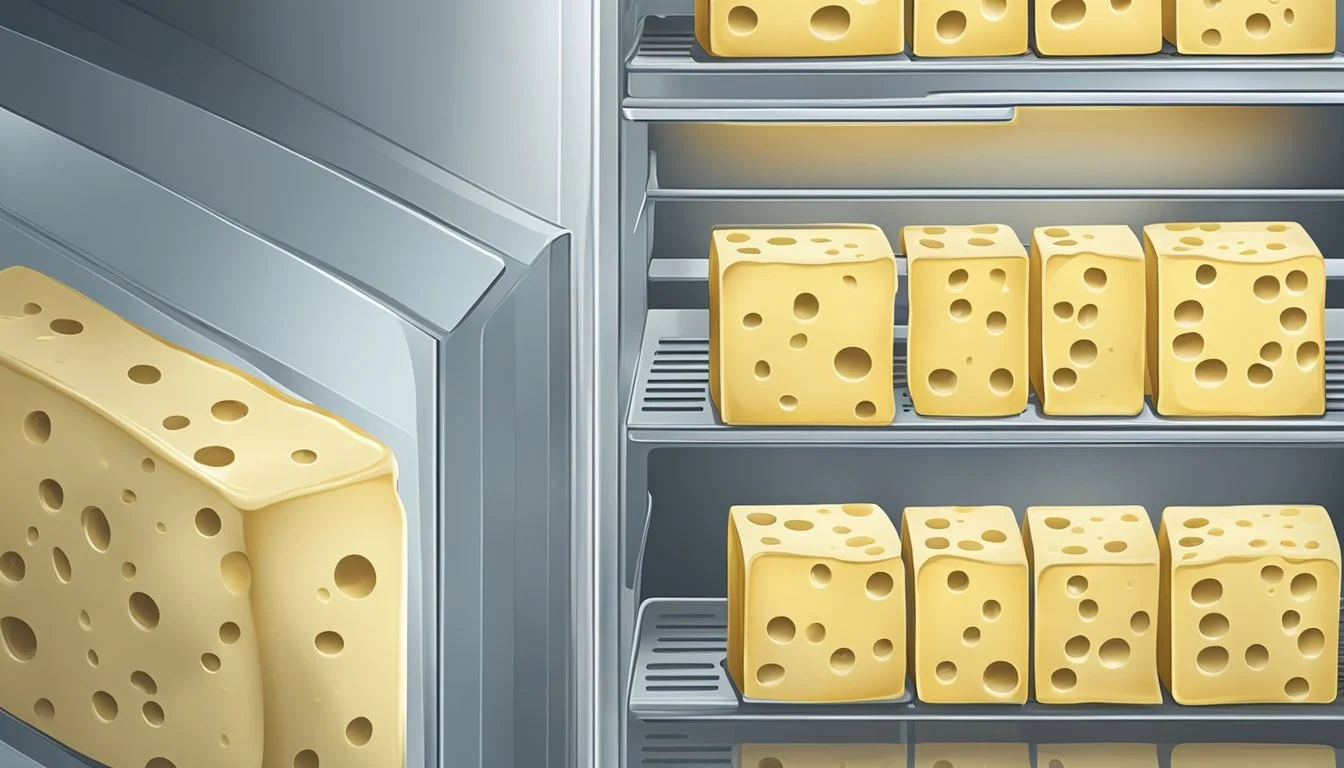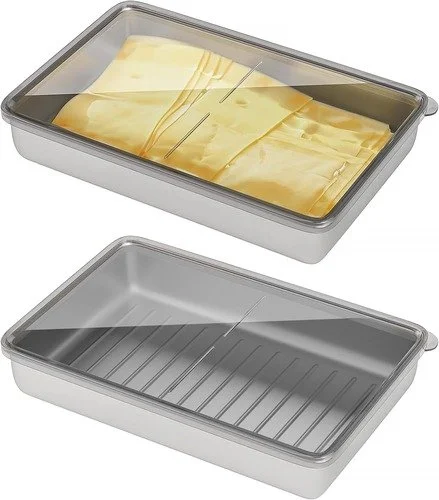How Long Does Swiss Cheese Last?
Shelf Life and Storage Tips
Swiss cheese, recognized for its distinctive holes and mild, nutty flavor, is a staple in many kitchens around the world. A key concern for consumers is how long they can enjoy the quality of their Swiss cheese after purchase. The longevity of Swiss cheese in the refrigerator depends on several factors, including storage conditions and whether the cheese is opened or unopened.
When stored properly, unopened Swiss cheese can maintain its quality for up to six months past the sell-by date due to its low moisture content, which retards the growth of bacteria. However, once opened, it is best consumed within three to four weeks. During this period, consumers can enjoy the optimal taste and texture that Swiss cheese has to offer. The quality of the cheese can be preserved by wrapping it in parchment paper followed by a loose layer of plastic wrap before placing it in the crisper drawer of the refrigerator.
Swiss Cheese Fundamentals
In the realm of cheese, Swiss cheese stands out due to its distinct characteristics and nutritional profile. This section delves into what exactly Swiss cheese is and its nutritional value in comparison to other cheese varieties.
What Is Swiss Cheese?
Swiss cheese refers to a group of cheese varieties that originated in Switzerland, known for their signature holes, also called "eyes," and a mild, nutty flavor. These eyes form due to the production process where bacteria release gases during fermentation. The size and number of eyes in Swiss cheese also serve as an indicator of flavor strength; larger eyes typically mean a more pronounced flavor.
It's worth noting that while Swiss cheese can encompass various types, the term in the United States generally refers to Emmental or derivatives thereof. Swiss cheese production involves a method that creates a low moisture content, imparting to it a longer shelf life compared to cheeses with higher moisture content like mozzarella.
Nutritional Value
Swiss cheese possesses a nutritional profile that boasts ample protein and calcium, making it a beneficial addition to a balanced diet. Here is a comparison of Swiss cheese's nutritional content to other popular cheese types per ounce (28 grams):
Nutrient Swiss Cheese Cheddar Mozzarella Parmesan Gouda American Cheese Calories 111 113 85 111 101 94 Protein 7.6g 6.5g 6.3g 10.1g 7.1g 5.3g Fat 9g 9.3g 6.3g 7.3g 8.2g 7.7g Calcium 221mg 204mg 143mg 335mg 198mg 174mg Lactose Low Low Low-Medium Very Low Low Medium
Swiss cheese is a lower lactose option, comparable to other aged cheeses like cheddar and parmesan, which can make it a preferable choice for those with lactose sensitivities. The high calcium content is indicative of its potential health benefits, particularly in bone health.
When discussing its fat content, it's crucial to mention that, while not the lowest, Swiss cheese offers a balanced supply, making moderate consumption appropriate within a health-conscious diet. It is less fatty than American cheese and comparable to other favorites like cheddar and gouda, offering versatility in dietary planning.
Storing Swiss Cheese
Proper storage of Swiss cheese is crucial to maintain its flavor, texture, and safety. Below are the best practices for storing Swiss cheese, including considerations for refrigeration and freezing.
Optimal Storage Conditions
To preserve the quality of Swiss cheese, it should be stored at a consistent temperature of 34-38°F (1-3°C). The cheese needs to be shielded from exposure to air to prevent drying out and protect against foodborne illness.
Swiss Cheese in the Fridge
Swiss cheese belongs in the refrigerator, ideally in the crisper drawer where the conditions are somewhat more regulated. It can last for 3 to 4 weeks in the fridge if it’s wrapped properly. For increased longevity, the cheese can be wrapped in parchment paper followed by a layer of plastic wrap or sealed within an airtight container.
Freezing and Its Effects
Swiss cheese can be frozen for up to six months, although freezing may alter the texture. To freeze Swiss cheese, it should be cut into small portions, wrapped in aluminum foil or plastic wrap, and then placed in an airtight container or a freezer bag.
Packaging for Freshness
The key to extending the freshness of Swiss cheese is by limiting exposure to air. It's advised to use the cheese's original packaging if it is resealable or to rewrap it tightly in wax paper, followed by plastic wrap or aluminum foil. When frozen, ensure that the wrapping is secure to prevent freezer burn.
Quality and Spoilage Indicators
Determining the quality of Swiss cheese involves assessing several factors such as flavor, color, and texture. This section will guide you through the key indicators of freshness and signs to recognize if the cheese has spoiled.
Recognizing Freshness
Fresh Swiss cheese has a pale yellow color and a firm yet slightly elastic texture. One should notice a mild, nutty flavor and a characteristic earthy odor that is not overpowering. Consistency in color and a clean, fresh scent are strong indicators of a fresh Swiss cheese.
Signs of Spoilage
Spoilage in Swiss cheese is marked by a few distinct signs:
Mold: Any visible mold on the surface, which could be varied in color, signifies spoilage.
Odor: A sour or ammonia-like smell can signal that the cheese has gone bad.
Texture: A slimy texture indicates bacterial growth and a cheese that is past its prime.
Color: Discoloration suggests that the cheese is no longer suitable for consumption.
It is advisable to discard cheese that displays any of these spoilage indicators, as consuming spoiled Swiss cheese could lead to foodborne illness.
Shelf Life of Swiss Cheese
The longevity of Swiss cheese depends on its storage conditions and whether the package is opened or unopened. With proper care, this cheese can remain edible past its sell-by date.
Unopened vs. Opened Cheese
Unopened Swiss cheese typically retains its quality for approximately four to six weeks beyond the printed sell-by date when refrigerated. Once the seal is broken, opened Swiss cheese is best if consumed within one to two weeks, ensuring optimal flavor and safety. Here's a brief overview:
State Shelf Life Unopened 4 to 6 weeks past sell-by date Opened 1 to 2 weeks for best quality
Factors Affecting Longevity
Several factors influence the shelf life of Swiss cheese:
Moisture Content: A drier composition, with moisture content typically between 35% to 45%, helps Swiss cheese last longer as it is less prone to spoilage.
Temperature: Consistent refrigeration, ideally at temperatures between 34°F (1°C) and 40°F (4°C), is crucial in slowing down the proliferation of bacteria.
Light and Oxygen Exposure: Stored away from light and tightly sealed reduces cheese exposure to oxygen, thus decreasing the risk of mold and spoilage.
For extended freshness, store Swiss cheese tightly wrapped in plastic wrap or aluminum foil, or place it in an airtight container to prevent drying out. Regular checks for mold or off-odors are recommended to assess suitability for consumption.
Using Swiss Cheese in Cooking
Swiss cheese is known for its versatility in various dishes, ranging from casseroles and soups to fondue and quiche. Its melting characteristics make it ideal for recipes requiring a smooth, creamy texture.
Incorporating into Recipes
Swiss cheese can enhance the flavor profile of many dishes. Chefs commonly slice or shred it into casseroles or soups for a mild, nutty taste. Additionally, cubes of Swiss cheese are a staple in fondue, and thin slices can elevate the richness of a quiche. The cheese's ability to blend well with other ingredients makes it a popular choice in the kitchen for a plethora of recipes.
Melting Characteristics
When it comes to melting, Swiss cheese is exemplary due to its medium-firm consistency. The key is gentle heat, which can result in a melted texture ideal for creamy sauces (What wine goes well with creamy sauces?) or toppings.
Fondue: Swiss cheese is a traditional choice for fondue, providing a smooth, decadent dip.
Cooking: Excessive heat should be avoided as it can cause the cheese to become tough and oily.
Leftovers and Food Safety
Leftovers containing Swiss cheese should be handled with care to prevent food poisoning.
Safety: Keep leftovers in airtight containers and consume them within 3 to 4 days.
Proper storage: Refrigerate promptly and keep at a consistent temperature to maintain quality and safety.
Creative Culinary Uses
Swiss cheese, with its distinctive flavor and meltability, is not only a staple in the refrigerator but also a versatile ingredient that can enhance a variety of dishes.
Preparing Cheese Platters
A cheese platter showcases the diversity and richness of cheeses. Swiss cheese is a must-have due to its nutty, slightly sweet profile. When arranging a cheese platter, it's important to include a variety of textures and flavors. Alongside Swiss cheese, one might incorporate soft cheeses like brie and creamy ricotta, as well as sharper options such as blue cheese and tangy feta. Offering processed cheese on platters is generally avoided, as it lacks the complexity of traditional cheeses.
To make the platter visually appealing and palate-pleasing:
Sliced Swiss cheese: Ideal for its pliable nature, serving in small triangles.
Other cheeses: Selections should range from soft to hard, each labeled accordingly.
Table setup:
Hard cheeses: Pre-sliced for convenience.
Soft cheeses: Served in wedges with a knife for spreading.
Enhance the platter with accompaniments like nuts, dried fruits, olives, and a variety of crackers or artisanal breads.
Swiss Cheese in Everyday Meals
Swiss cheese's melting qualities make it a favorite in hot dishes. In addition to being a classic ingredient in sandwiches and burgers, Swiss cheese can elevate the flavor profile of salads when used in moderation.
Everyday meal ideas include:
Sandwiches: Add a slice of Swiss cheese to turkey or ham sandwiches for a rich, melty touch.
Burgers: Include a slice of Swiss cheese during the last minute of grilling for a gooey topping.
Salads: Shred or cube Swiss cheese to add protein and flavor to garden or chef salads.
Remember, Swiss cheese should be used thoughtfully, bearing in mind both its taste and how it pairs with other ingredients to maintain a harmonious dish.
If you can’t find these ingredients in your local markets, you can order Swiss cheese online!
Frequently Asked Questions
In this section, we address some of the most frequent queries regarding the proper storage and selection of Swiss cheese, ensuring the cheese maintains its intended flavor and quality.
Common Storage Queries
When it comes to Swiss cheese, keeping it fresh involves proper storage techniques. Cheese should be stored in the refrigerator, ideally within the temperature range of 35°F to 40°F (2°C to 4°C).
In the Fridge:
Unopened Swiss cheese can last for up to 6 months past the sell-by date if refrigerated properly.
Once opened, it is advised to consume Swiss cheese within 3 to 4 weeks to ensure the best taste and flavors.
Freezing:
For extending its shelf life, Swiss cheese can be frozen for up to six months.
Before freezing, wrap the cheese tightly in plastic wrap or aluminum foil. Place it in a freezer bag to avoid contamination.
Airtight Containers:
If available, a cheese dome or an airtight container can be a great way to keep Swiss cheese fresh while preventing it from absorbing other flavors from the refrigerator.
Discover the endless possibilities of buying airtight containers online.
Selection and Purchase Tips
Choosing and purchasing the right Swiss cheese contributes markedly to how long and well it lasts.
Examining Ripe Cheese:
Look for cheese that appears moist but not wet, and avoid any with signs of mold or a sour smell, as this indicates contamination.
Ensure the sell-by date allows enough time for consumption, keeping in mind the various storage durations.
Different Varieties:
Recognize that different varieties of Swiss cheese may come with specific storage instructions to maintain their unique taste profiles.
Swiss cheese with more moisture content may not last as long as drier varieties, even under ideal storage conditions.
When purchasing Swiss cheese, consumers should ask questions about storage recommendations and how to tell if the cheese is ripe. This can prevent any future issues with taste and prevent unnecessary waste due to spoilage.










